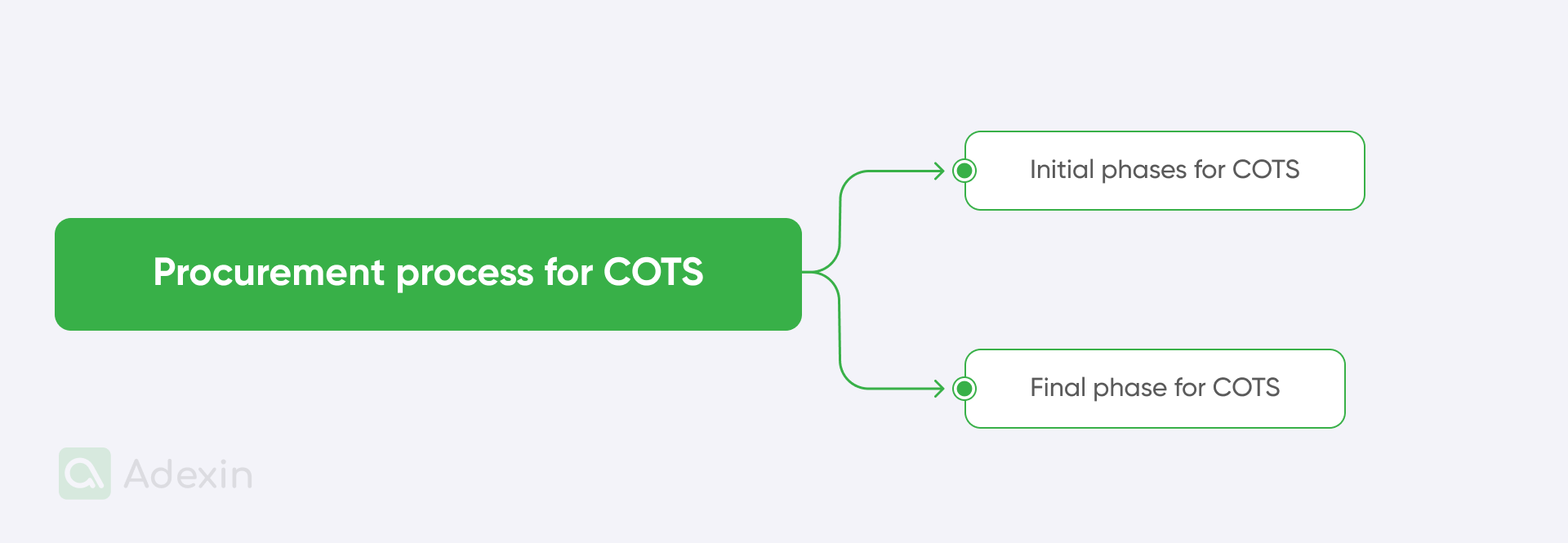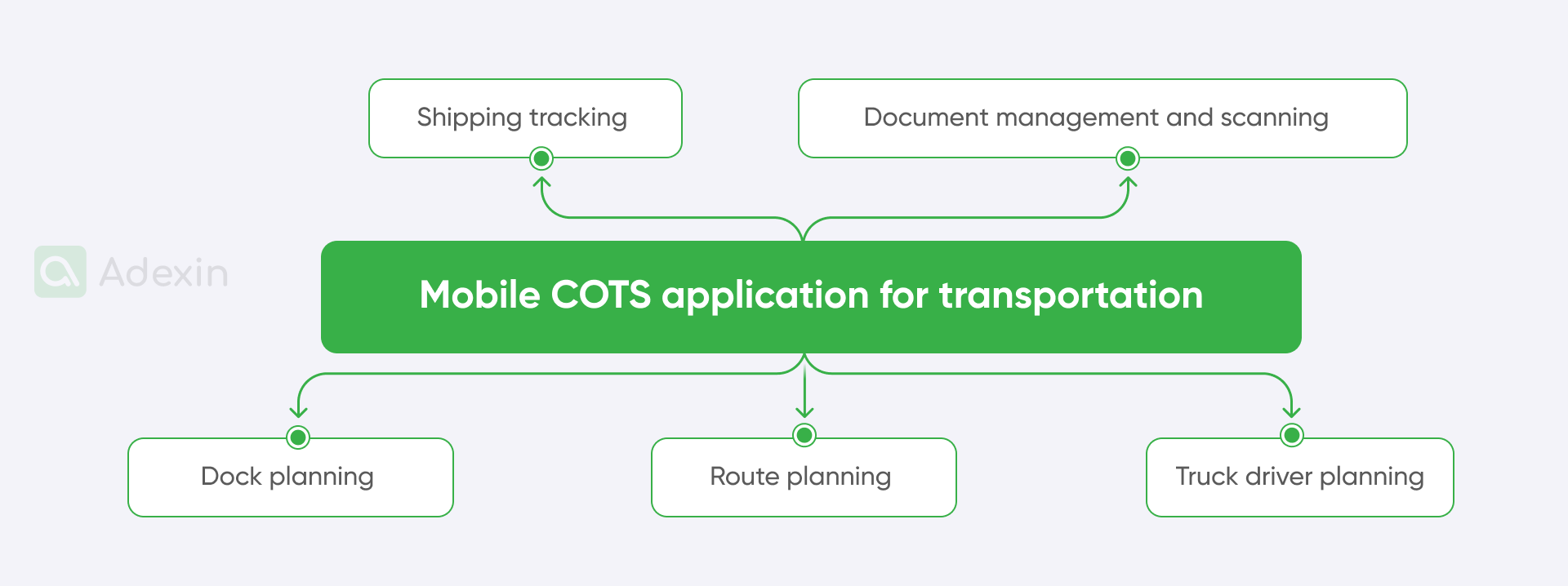COTS software is composed of the most popular options that support transportation, logistics, and supply chain operations. COTS software providers emphasize accessibility and quick downloads from app stores. While COTS software provides easy access, it needs a fully customized interface, often serving a single purpose with limited configuration and integration. On the other hand, custom software development integrates all functions in both mobile and desktop versions. You can improve the quality of work in transportation, logistics, and supply chain operations with a more personalized and integrated solution.
Plug and play: understanding off-the-shelf software and integration
Moving through the extensive market of software providers, we can find the two most common approaches. One is custom software development, where transportation, logistics, and supply chain companies can rely on a fully tailored solution to their business needs. The second solution is commercial off-the-shelf (COTS), which enables customers to use a ready-made software solution.
COTS presents a fully integrated system, facilitating efficient data utilization throughout the organization. It promotes the standardization of functionalities and user interfaces. While this standardized approach may impose some limitations for users seeking more tailored solutions, it mitigates the system management issues that can arise over time with non-integrated solutions.
Commercial off-the-shelf software (COTS) requires development only in the very early stage when the software provider wants to offer its solution in the software as a service (SaaS) model. In this case, development considers various components that should be embedded into the Software. COTS solutions often cannot cope with all market complexities, as these solutions include mostly generic features and functionalities.

COTS solutions can have the same number of advantages and disadvantages. When we're talking about the supply chain, logistics, or transportation, it's easy to focus on several of the most common processes that require automation within the software. This is how COTS really works. Software providers focus on the significant processes standard for each industry, intending to provide it to the broadest number of users. Customization, in that case, is often omitted.
We can commit that developing a COTS solution for transportation, logistics, or supply chain will cover processes that require constantly repeatable actions and can replace manual work to some extent. Here are the most common areas in transportation and logistics support within the COTS software:
Support for financial operations by providing an invoicing system.
Data collection for analytics from transportation and warehousing.
Supporting autonomous transportation and delivery management.
Shipping and carrier traceability.
Automation technologies for other parts of the supply chain, such as intermodal transportation.
These are the functions built into the COTS software and are the easiest to commercialize. It is also worth noticing that support for these processes may vary based on the level of technology involved. We can say that one software provider can offer traceability support within the COTS. Still, there will be limited access to the maps in all regions of certain countries, or the maps will only be updated occasionally to provide 100% support for truck drivers. This boils down to choosing COTS, which may be more costly than devoting your solution to a custom software development provider.
COTS software primarily focuses on an integration engine to enable connectivity with some existing systems and side software solutions already deployed within an organization. All that to provide a seamless connection with the COTS solution. This is why for the companies in transportation, logistics, and supply chain that want to purchase COTS solutions, it is most important to go through the procurement process. This process can help them validate actual business needs versus COTS.

Procurement process for COTS:
Initial phases for COTS
Companies prioritize selecting a widely used COTS product and the most experienced supplier in the transportation, logistics, or supply chain industry. The emphasis is put on a supplier with a successful track record of implementations. Supplier references provide evidence of these qualities and are crucial for this phase.
Final phase for COTS
The primary selection factor shifts to the overall price in this phase. In fact, that constitutes 40% of the final decision-making process effort. Here, COTS deliverability projects and usability also play a significant role. This process results in a usability review integrated into the tender scoring process.
Smart mobility: leveraging COTS apps for transportation
Similar to COTS software itself, several mobile applications on the market can support transportation, logistics, or supply chains. The best benefit of using COTS mobile apps for transportation is accessibility. You can most likely download the mobile app from the App Store or Google Play Store within just a few seconds, and you can start working with it.

The most popular solutions for transportation apps include shipping tracking, document management and scanning, dock planning, route planning, and truck driver planning.
Accessibility is a significant advantage, but along with this comes disadvantages, where you cannot benefit from a fully customized interface. Moreover, these apps propose a single solution with limited configuration and no integration. Most probably, your people will still need to use traditional emails to share data across departments.
A different way is to use a custom software development team. Such a software provider can integrate all separate functions and enable you with a mobile and desktop version of the same application. This definitely improves work quality within transportation, logistics, and supply chain.
Next-gen logistics: custom software development for supply chain transformation
In today’s fast-evolving logistics landscape, agility, visibility, and efficiency are more than just competitive advantages, they're necessities. Traditional supply chain systems, often reliant on siloed data and manual processes, are no longer sufficient to meet the demands of global commerce. That’s where custom software development steps in, offering tailored solutions that drive digital transformation across the supply chain.
Custom logistics software enables businesses to build solutions that are precisely aligned with their operational workflows, regulatory environments, and customer expectations. From real-time inventory tracking and AI-powered demand forecasting to dynamic route optimization and automated warehouse management, bespoke applications empower organizations to make smarter, faster decisions.
Need help with custom software development for your logistics business?
Learn how we can help you
Explore moreUnlike off-the-shelf platforms, custom-built systems offer scalability, seamless integration with existing infrastructure, and the ability to adapt to evolving market needs. Whether it's connecting IoT devices for real-time asset monitoring or using machine learning to predict disruptions, custom software forms the backbone of a resilient, future-ready supply chain.
As the logistics industry embraces Industry 4.0, investing in tailored digital tools isn't just about modernization, it's about transformation. Businesses that prioritize custom development are better positioned to innovate continuously, reduce operational friction, and deliver superior customer experiences.
TOP 6 benefits of a ready-made COTS systems
Popular off-the-shelf Software is more vulnerable to hackers. COTS software features remain the same and are less susceptible to manipulation. Off-the-shelf solutions may not align with business goals and may have limited integration capabilities. Nevertheless, it can still be beneficial for some reasons. Here is how you can benefit from using a ready-made COTS system:
In both cases, whether it is a custom or COTS software solution, your business can be enabled with much higher capabilities for transit management. These are transportation management solutions that can elevate your business operations.
Top 8 benefits of custom software solutions
Here are the other benefits you can take advantage of by making a choice on custom software development:
COTS vs custom solutions: balancing costs and capabilities
Companies can consider two ways of software implementation within the supply chain, logistics and transportation. They may choose between COTS and custom software. Many companies, small and medium-sized businesses, are facing the challenge of choosing between the.
In the first instance, it is easy to look at COTS as a ready-made solution that is easy to use because there is easy access to documentation, and most probably, these companies can provide some track record of customers using the same solution. Nevertheless, customer satisfaction with using these COTS solutions is often questionable.
However, custom software development is still perceived as more expensive initially, and there may also be some problems with deadlines for deliverability. Naught could be further from the truth. This is because custom software development focused on a particular market niche is far more effective than COTS. They may also provide out-of-the-box solutions by using, for example, a software environment that accumulates industrial and technical expertise in the form of a ready-made codebase.

Here are the common areas that involve the costs of custom development:
Project management
Quality control and testing with functional design
Technical design
Software construction
Final test
Roll out
Here are the common areas that involve the costs of COTS software:
Installation
Subscription/annual licensing fees (monthly/yearly)
Number of users
Data transfer
Hosting
Updates/upgrades
Additional features (unavailable in the basic subscription model)
Finale takeaway
Looking through industries such as transportation, logistics, and supply chain, we can see a lot of room for deploying digital solutions to help automate complex and repetitive processes. This always helps keep your business costs low and maintain an error-free work environment, which is, in fact, also cost-effective.
The matter of fact is to choose between COTS or custom software, which is not an easy task. However, you may consider the benefits and disadvantages and make the most suitable choice.
At Adexin, we can help you make the optimal choice for your business by developing and implementing a software solution that meets your business requirements in the long run. Here, our code base can be used to support your business with solutions for transportation, logistics, or supply chain. Contact us today, and let's look closely at your business needs.
Need your development by 30% cheaper and faster
Let’s find the best solution together
Explore more

